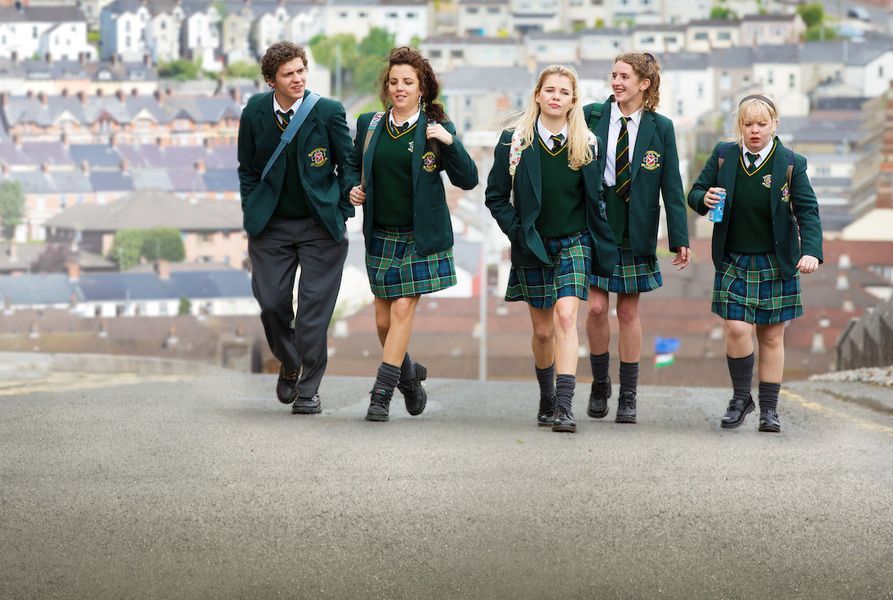As the auditions to ‘Stars In Their Eyes’ comes to an end, the titular Derry Girls are alarmed to see one of the mothers flirting with the hunk from Leinster: “Mammy’s having an affair.” It’s not a throwaway remark (half the women, and some of the men, literally spend the entire episode ogling Damien Molony’s Gabriel); rather, it’s proof that the series is happy to subvert stereotypes about Irish culture on its own head, culminating in a striking reveal that shows that the “Mammy” is more interested in pushing her brain cells than her hips.
Derry Girls manages to break the taboo of setting a comedy in Northern Ireland during the height of The Troubles. What makes the show successful is the fact that it doesn’t highlight the atrocities, but rather demonstrates how plain and ordinary the surreality was for a quartet (quintet, if you include the “wee English fella”) of schoolgirls in Derry. The serial crosses borders (literally) with the inclusion of comedic laureate Tommy Tiernan, who ties the series back to Father Ted, the shimmering sitcom that showed Ireland as a place of strange, albeit understated, beauty.
Like Father Ted, Derry Girls is rife with Catholic imagery, as priests and nuns do their best to fashion an image of a more equal society based on the teachings that have furnished them on their mission to self-fulfilment and absolution. In the centre of these proceedings stands Sister Michael, the boisterous nun, all quips and snide remarks, who aches for the day she can retire and leave these meddling teenagers behind.
The series is replete soul – something which was sorely lacking from the dreadful London Irish, the project Lisa McGee fashioned prior to writing Derry Girls – giving nuance to the island Mrs.Brown’s Boys has spent decades ridiculing. What we get with Derry Girls, then, is something that is fragile, fiery and deeply human.
But the biggest stroke of brilliance is the casting of Dylan Llewelyn as a teenager sent to the all-girls school because of his English accent. His cousin Michelle (the boisterous Jamie Lee O’ Donnell) informs him that his mother intended for him to be “aborted” when she travelled to London, and he spends the next three series stumbling on revelations that are more shocking than the ones that came before.
He’s stunned to hear that they can’t hand an IRA gunman, seated in the boot of the family vehicle, over to the police, just as he’s shocked by the constant need to eat lardy chips as a weekly treat. But most of all, he’s the ultimate outsider: The series only bona fide Brit, Llewelyn’s James is mistrusted on both sides of the conflict, including the loyalists who see him as an outside threat.
If the series has a masterpiece, it’s the training exercise that sets out to unite the Catholic and Protestant contingents in their hopes to build a modern Northern Ireland. Teenagers, as teenagers are wont to do, can only see the differences in their opponents, whether it’s the number of freckles that speck around their bodies, or the ABBA tunes that make up their playlists. Only by the presence of the parents do the teenagers realise that they are all frustrated by the constant niggling demands of the older generations, and they come up with a similarity that unites them all.
The series is littered with tracks from the 1990s, whether it’s the pounding refrains of Elastica’s ‘Connection’, or the haunting chimes of Enya, cascading over Molony as he attempts to undress a woman with his mind. In keeping with the era, the songs flit in and out of the work, demonstrating the loneliness, wilfulness and headstrong nature of the characters in question.
But it’s the central performances that make the series so immensely re-watchable, as each of them carries a sense of history that shows the importance of their place in it.
